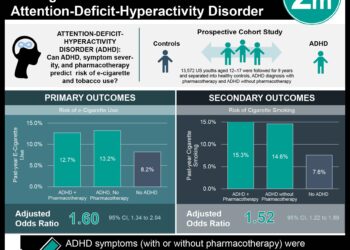Childhood ADHD, stimulant treatment not linked with height
1. Childhood attention-deficit/hyperactivity disorder (ADHD) diagnosis was not associated with changes in peak height velocity (PHV) or final adult height when compared to undiagnosed individuals.
2. Stimulant treatment for childhood ADHD was associated with a delayed PHV without a significant difference in final adult height when compared to those who went untreated.
Evidence Rating Level: 2 (Good)
Study Rundown: Stimulant treatment for childhood attention-deficit/hyperactivity disorder (ADHD) has long been postulated to affect growth. This study examined the effects of ADHD diagnosis and length of stimulant treatment on various indicators of growth velocity and adult height. The authors found that ADHD itself was not associated with a change in magnitude of peak height velocity (PHV), the age of PHV, or final adult height. While stimulant treatment was not shown to be associated with magnitude of PHV nor final adult height, stimulant-treated males were found to have a delayed PHV without a difference in final adult height. It is unclear how generalizable these results are, as the cohort used in the study was small and homogenous and the accuracy of the height measurements obtained during stimulant treatment is unknown. However, the use of researcher-obtained adult heights adds strength to the conclusion that stimulants may not affect final adult height and therefore should not be a major consideration in the medical management of ADHD.
Click to read the study, published today in Pediatrics
Study Author, William J. Barbaresi, MD, talks to 2 Minute Medicine: Director, Developmental Medicine Center, Boston Children’s Hospital; Associate Chief, Division of Developmental Medicine; Wade Family Foundation Chair in Developmental Medicine; Associate Professor of Pediatrics, Harvard Medical School.
“Although stimulant medications have been in use for decades, and studies have attempted to address the concern that stimulant treatment may adversely impact growth, this issue has remained unanswered and controversial. Almost every parent who is considering stimulant treatment for their child with ADHD asks about the impact on growth. This study provides the first large, population-based, long-term study of stimulant treatment and growth from childhood through adulthood. The results indicate that stimulant treatment did not have a significant impact on growth patterns or on final adult height, a finding which should provide some reassurance to parents who are considering treatment for their child with ADHD and for the clinicians who are working with these families.”
In-Depth [prospective and retrospective cohort study]: A birth cohort from 1976-1982 from the Rochester Epidemiology Cohort provided ADHD cases and non-ADHD gender- and age-matched controls for study inclusion. A total of 243 ADHD cases (72.6% male, N = 171 simulant-treated, N = 65 untreated) and 394 non-ADHD age-matched controls (72% male) were included. Participant heights and stimulant treatment information were retrospectively obtained from clinical records and adult height was followed from 2010 onward. ADHD cases were considered stimulant-treated if participants received a cumulative duration of treatment for ≥3 months between the ages of 2 and 20 years. No significant difference in adult height magnitude of PHV, or age of PHV occurrence between ADHD cases and controls was observed in either gender; however, the mean age of PHV among males was significantly later in stimulant-treated ADHD cases when compared to untreated ADHD cases (13.5 years ± 1.0 vs. 12.9 years ± .2, P = 0.002). There was no significant difference in adult height between stimulant-treated ADHD cases and untreated ADHD cases as well as no significant correlation between stimulant treatment duration and adult height in either gender.
Image: PD
©2012-2014 2minutemedicine.com. All rights reserved. No works may be reproduced without expressed written consent from 2minutemedicine.com. Disclaimer: We present factual information directly from peer reviewed medical journals. No post should be construed as medical advice and is not intended as such by the authors, editors, staff or by 2minutemedicine.com. PLEASE SEE A HEALTHCARE PROVIDER IN YOUR AREA IF YOU SEEK MEDICAL ADVICE OF ANY SORT.









